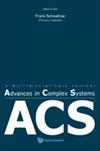Modeling social resilience: Questions, answers, open problems
IF 1
4区 数学
Q4 MATHEMATICS, INTERDISCIPLINARY APPLICATIONS
引用次数: 3
Abstract
Resilience denotes the capacity of a system to withstand shocks and its ability to recover from them. We develop a framework to quantify the resilience of highly volatile, non-equilibrium social organizations, such as collectives or collaborating teams. It consists of four steps: (i) \emph{delimitation}, i.e., narrowing down the target systems, (ii) \emph{conceptualization}, .e., identifying how to approach social organizations, (iii) formal \emph{representation} using a combination of agent-based and network models, (iv) \emph{operationalization}, i.e. specifying measures and demonstrating how they enter the calculation of resilience. Our framework quantifies two dimensions of resilience, the \emph{robustness} of social organizations and their \emph{adaptivity}, and combines them in a novel resilience measure. It allows monitoring resilience instantaneously using longitudinal data instead of an ex-post evaluation.建模社会弹性:问题,答案,开放的问题
弹性是指系统承受冲击的能力和从冲击中恢复的能力。我们开发了一个框架来量化高度不稳定、非平衡的社会组织(如集体或合作团队)的弹性。它包括四个步骤:(i)\emph{划界},即缩小目标系统;(ii)\emph{概念化},即。确定如何接近社会组织,(iii)使用基于\emph{代理和网络模型的组合的正式表示},(iv)\emph{操作化},即指定措施并展示它们如何进入弹性的计算。我们的框架量化了弹性的两个维度,即社会组织的\emph{稳健性}和\emph{适应性},并将它们结合在一个新的弹性测量中。它允许使用纵向数据而不是事后评估来实时监测弹性。
本文章由计算机程序翻译,如有差异,请以英文原文为准。
求助全文
约1分钟内获得全文
求助全文
来源期刊

Advances in Complex Systems
综合性期刊-数学跨学科应用
CiteScore
1.40
自引率
0.00%
发文量
121
审稿时长
6-12 weeks
期刊介绍:
Advances in Complex Systems aims to provide a unique medium of communication for multidisciplinary approaches, either empirical or theoretical, to the study of complex systems. The latter are seen as systems comprised of multiple interacting components, or agents. Nonlinear feedback processes, stochastic influences, specific conditions for the supply of energy, matter, or information may lead to the emergence of new system qualities on the macroscopic scale that cannot be reduced to the dynamics of the agents. Quantitative approaches to the dynamics of complex systems have to consider a broad range of concepts, from analytical tools, statistical methods and computer simulations to distributed problem solving, learning and adaptation. This is an interdisciplinary enterprise.
 求助内容:
求助内容: 应助结果提醒方式:
应助结果提醒方式:


